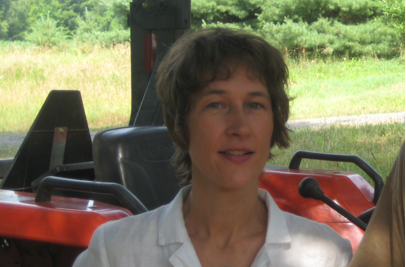It's our mantra at this point: "Just because you want to work in food doesn't mean you have to work directly with food." And Alice is a great example. Although she tried her hand at farming, she quickly realized her strengths were as an educator, communicator, and organizer: clearly the agricultural world could benefit from her skills without her having a green thumb or a sixth sense of the Farmer's Almanac. Turns out instead of supporting one farm (her own), she's able to support over 700. Sounds to us like a fruitful career move.
Editor's Note: Jealous of Alice's job? You don't have to be. Check out the recent job post for Program Assistant at Certified Naturally Grown.
What attracted you to a good food job?
The soil. I had lived in New York City for ten years when I moved to the Hudson Valley, looking for a more robust connection to nature. While plotting my next move, I happily worked my garden in the rain, and wished I had a background in ecology, instead of urban policy and philosophy. Growing my own produce was very satisfying, but becoming a farmer wasn't the answer. Farming is really incredibly hard work, and wouldn't tap into the skills I wanted to use. Running a grassroots organization of farmers, on the other hand . . . that was a good fit.
How did you get your current good food job?
I knew I'd have to be creative to get a job in a rural area given my urban policy background and lack of connections locally. So I found a grassroots campaign that interested me and got involved as a volunteer. This organizing work (around a bill to require labeling of genetically engineered seeds in New York) would introduce me to many interesting people. I was calling local farmers, and one of them was Ron Khosla, a founder of Certified Naturally Grown. He listened to my spiel and after a brief discussion about my topic, he asked if he could tell me a bit about what he was working on, since he was looking for someone to take over his role as director, and I seemed like a good candidate. Now that was interesting. We met at his farm to discuss the details four and a half years ago, and the rest is history. I even brought the job back to the city with me.
Today I'm the executive director of Certified Naturally Grown, which is the grassroots alternative to certified organic for farmers and beekeepers. It's created specifically for small-scale, direct-market producers who are committed to organic agriculture, but were forbidden to use "organic" to describe their practices once the national organic program took effect in 2002 - unless they went through the certification process, which is really too expensive and time-consuming for many small farms.
How did your previous work or life experience prepare you for a good food job?
Growing up in rural Vermont helped me appreciate good food that's grown nearby, and probably made me more sensitive to the degradation of the American diet. I've always enjoyed building grassroots organizations, and that experience, and enjoyment, lead me to take on my current position. I think many good food jobs are not unlike other jobs in terms of the experience needed. To build the infrastructure of a sustainable food system will take all types of skills and personalities. Much of it isn't glamorous, but it can be incredibly rewarding - even if it doesn't take place behind a lovely display of delicious artisanal food at a farmers market on a sunny Saturday morning . I spend most days in an office, but I receive grateful appreciation from CNG farmers on a regular basis for the work I do running Certified Naturally Grown.
What advice do you have for others in search of a good food job?
Even as you submit your resume and respond to job openings . . . increase the odds that something unexpected will happen. Generate opportunities to meet people and get involved in things you care about. You might also create a job: think of what you want to do, then find someone who needs you to do it. I did that once and it worked!
If you could be compensated for your work with something other than money, what would it be?
Enough free time to live a balanced life of home-cooked meals, an active commitment to social justice, and lots of food-loving people who invite me over to dinner.









